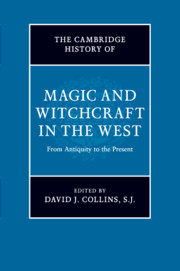Book contents
- The Cambridge History of Magic and Witchcraft in the West
- The Cambridge History of Magic and Witchcraft in the West
- Copyright page
- Contents
- Notes on Contributors
- Introduction
- Part I Antiquity
- Part II The Early Latin West
- Part III Parallel Traditions
- Chapter 7 Magic in Medieval Byzantium
- Chapter 8 Magic, Marvel, and Miracle in Early Islamic Thought
- Chapter 9 Jewish Magic in the Middle Ages
- Part IV Old Europe
- Part V Colonial Encounters
- Part VI The Modern West
- Bibliography
- Index
Chapter 8 - Magic, Marvel, and Miracle in Early Islamic Thought
from Part III - Parallel Traditions
Published online by Cambridge University Press: 05 March 2015
- The Cambridge History of Magic and Witchcraft in the West
- The Cambridge History of Magic and Witchcraft in the West
- Copyright page
- Contents
- Notes on Contributors
- Introduction
- Part I Antiquity
- Part II The Early Latin West
- Part III Parallel Traditions
- Chapter 7 Magic in Medieval Byzantium
- Chapter 8 Magic, Marvel, and Miracle in Early Islamic Thought
- Chapter 9 Jewish Magic in the Middle Ages
- Part IV Old Europe
- Part V Colonial Encounters
- Part VI The Modern West
- Bibliography
- Index
Summary
Keywords
- Type
- Chapter
- Information
- The Cambridge History of Magic and Witchcraft in the WestFrom Antiquity to the Present, pp. 235 - 267Publisher: Cambridge University PressPrint publication year: 2015
- 4
- Cited by

